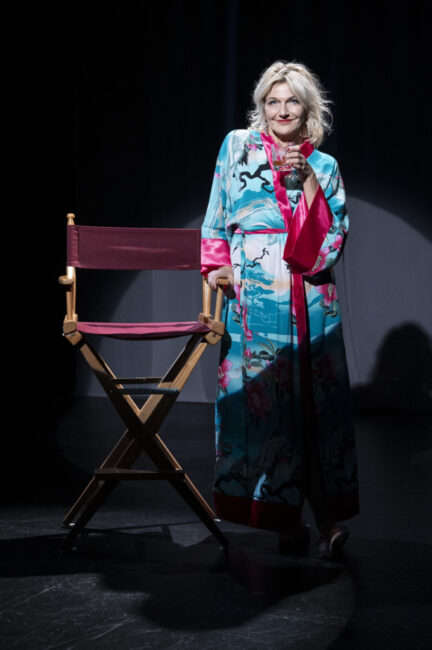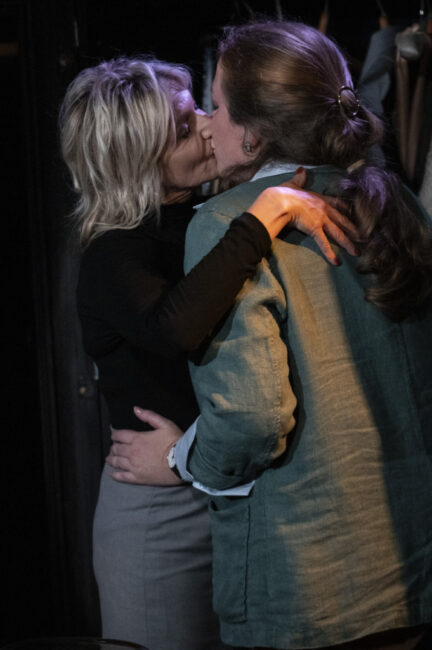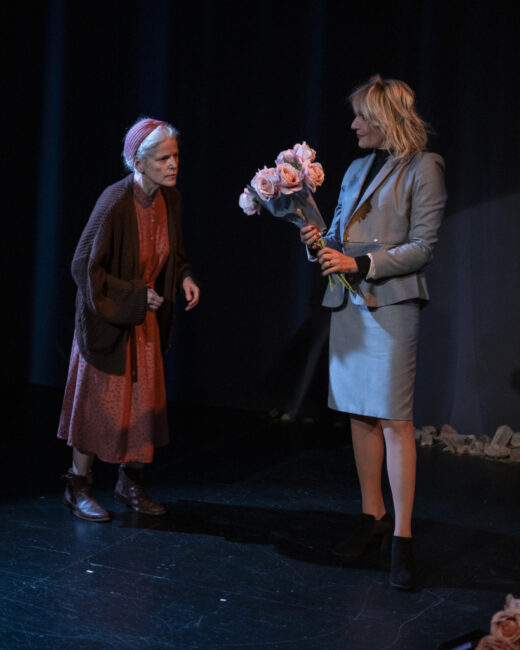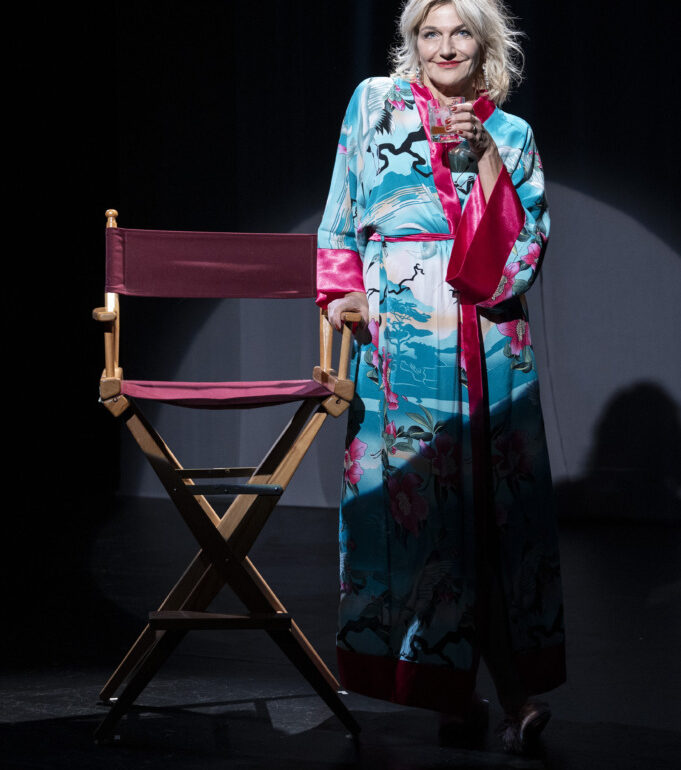author: Erin Tarpley
Marlene Dietrich was a legend of the Silver Screen, but she was by no means a monolith.
Before the curtain rises, the audience is presented with a loop of a 1930 screen-test the notorious star filmed for The Blue Angel: the film that would eventually launch her into international acclaim. While shown without sound, this three-minute loop gives the audience an accurate preview of the many faces of Marlene Dietrich. A woman of glamor, a woman with style and finesse, but also a woman quick to temper and one with specific demands of how she would command all around her to present the image she desired.
In her long life, Marlene Dietrich was many things. While she will be forever remembered as a prominent legend of stage and screen, the evening you spend with Marlene in her dressing room before her Parisian one-woman concert will allow you to grasp a glimpse of her many other complicated sides. Ever the calculating artist, Marlene was always aware of public perception. And as the audience of this production is made well aware throughout the course of this evening, she is capable and committed to carrying out the most minute of details of how the world perceives her so as to maintain the glamorized illusion deftly spun around her like a magical spell.

Set in a Parisian theatre around 1970, this production of Marlene directed by Vanessa Gilbert and written by Pam Gems, seeks to capture Marlene when she is at the height of herself, rather than the height of her craft. By this point in her career, her days on the silver screen have passed, and she makes her living performing in one-woman concerts, singing her most well-renowned numbers. Additionally by this point in her life, while her days in the sun may have passed, she has only the well-crafted ambiance of the stage light and hand-picked aging usherettes to heighten her own fading image. But the time and experiences she has had over the last seven decades circling our sun have also given her the opportunity to hone and perfect her skill as a glamor-weaver to create the effects she wants to make her adoring fans (and herself) believe that her time in the lime-light will never end. Thus showing her as her most authentic self while she is anything but authentic.
Tennessee Dixon does a fine job of creating a simple, yet immersive, setting of a Parisian dressing room. Simple enough to allow the audience to build it into more in their own heads while also capturing the essence of a living stage. While Marlene is not impressed by the room, to the audience it is merely a space to partake and prepare in while waiting for showtime. The use of projections allows for the more prominent visuals of 20th century world leaders or propaganda clips to give heft to the musings and memories Marlene depicts throughout the evening.

Her assistant, friend, and lover-of-convenience for the evening (as Dietrich was prominently bi-sexual), Vivian (played by Valerie Adams Rigsbee), does a fantastic job of playing the ever-flexible slave to Marlene’s whims and moods. Rigsbee flits around the stage fetching this or answering to that for Marlene while maintaining an amicable tone that is both grating and admirable in the best way. Being a character familiar with Marlene’s mood swings and demands, and one that has been in Marlene’s life long enough to weather these maelstroms enough to have her very presence requested for the evening, Rigsbee encapsulates the emotional and diplomatic gymnastics needed to survive the whiplash of moment-by-moment existence in Marlene’s very presence.
Playing Marlene’s long-term (and mute) personal dresser, Mutti, is interestingly enough also the production’s speech coach, Hilary Kacser. While Mutti’s character never says a word in this production, Kacser’s performance says a lot. Framed as a holocaust survivor Marlene hired to attend her (while historically Dietrich was politically active and contributive to survivors of the holocaust, both during and after WWII), Kacser uses her bent body and facial emotions to both burden and deflect Marlene’s outbursts throughout the evening as she both fades into the background and takes command of “Stage Left” to be seen.
The evening itself is set in the hours before Marlene’s musical performance on the Parisian stage, and being a show with music, the show needs a pianist. While not listed as a character in the cast, the evening’s Pianist, played, and played, by Lucia LaNave, is a character in and of herself. Jaunty and cheeky, LaNave plays the musical performances of the evening immaculately, while also taking the off-moment to show a bit of playfulness that adds mirth to what could otherwise just be a straightforward musical concert.
But the titular character, and the one everyone comes to see for this evening is Marelene Dietrich, played by Karin Rosnizeck. Playing a figure larger than life, Rosnizeck has her work cut out for her, and does a marvelous job of bringing the legend of Marlene Dietrich to life. Neither completely likable nor dislikable, Rosnizeck is able to capture the highs and lows of a woman that is a living contradiction of herself. Hyperaware, yet oblivious, Rosnizeck captivates every movement by every character on stage while also causing chaos with her own actions. A sexual being, yet uninterested in sex, Rosnizeck encapsulates the “va-va-voom” of a woman that knows how to move her body while also knowing it is only a means to remain prominent in people’s minds. Famous for her singing, yet only had a limited range, Rosnizeck becomes Marlene personified in her musical performances.

So, in case it was not evident, this is indeed a play with music but it is in no way a musical. While the story itself is merely a glimpse into a night of Marelene Dietrich’s life before a musical performance, the last third of this production is the actual musical performance. The story itself is little more than a chance for the audience to view Marlene Dietrich for the glamorous, yet insecure, person that she was while hearing glimpses and mentions of fragments of her life, and then culminate with a collection of multiple renditions of her most well-known musical numbers. This was something I wish I knew more about before I went into this production. During the concert portion of this show, I kept waiting for the songs to end, and for some climactic moment to occur that would resolve at least some of the conflicts mentioned throughout the evening (Will Marlene commit to joining Vivian in New York for her own production? Will Mutti be “un-fired” again? Will Marlene ever remember the words to that “Illusions” song?). But when the last encore is over, that is the end of the show. And for all that this was, it was only an evening.
But, an evening with a legend is still an evening for the ages.
Marlene presented by ExPats Theatre plays now through October 20th at the Atlas Performing Arts Center. Get your tickets now before you are left wondering “Where Have All the Flowers Gone?”
Running Time: Approximately 90 minutes with no intermission.
Marlene plays through October 20th, 2024 at the Atlas Performing Arts Center, 1333 H St NE Washington, DC. For tickets call the box office at (202) 399-7993 ext. 501 or purchase them online.

